Work became routine: count them in, stamp their papers, issue coupons for free chocolate and cigarettes, give out cinema tickets and tell them which accommodation block to go to. One day out of a sea of faces I saw someone I recognised, it was one of the eleven KOYLI reinforcements with whom I had landed in France. It was good to learn that they had all survived and had, by the end of the war, reached Lübeck on the Baltic Sea coast.
Winter 1945 was quite severe. The Elbe froze over but ships were still able to break through the ice to get to the docks. It was a white Christmas. A few days before that Ron Smith, Bill Cooke and I looked into a Cuxhaven church. Bill, who came from Chesterfield, was an organ builder insisted we should go up into the organ loft. He played "White Christmas" and I was quite embarrassed to find we were not alone. Bill stopped playing and said he would play a hymn, but the German vicar said "No, continue because all beautiful music is praise!". I could not help wondering, and hoping, that if a British vicar had found German soldiers in his church he would have acted as graciously.
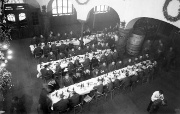 |
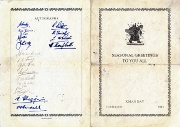 |
| Christmas lunch. Cuxhaven 1946. |
Christmas lunch menu. Cuxhaven 1946. |
Christmas dinner was in the big hall of the docks and it was quite splendid. Afterwards everyone, and that included our German workers, went to the local cinema for a screening of Blythe Spirit. It was quite an enjoyable time and I had further cause to celebrate because I was due for leave on December 28th. I sailed from Cuxhaven in one of our new ships the Empire Rapier. This was a 'Liberty' ship built during the war by the US. These ships were mass produced in welded section and supplied to the UK under 'Lend-Lease'.
When I got to Hull I went to Wilford. Una and I had planned to spend the twelve days together in Wilford and Watford. Una told me that the Co-operative Bakery office, for which she had worked for four years, had refused to give her time off work. I telephoned them to try to reverse their decision but I failed and I was left in no doubt that Una would lose her job if she did not work (Una left instead). Una and I had planned to get married when I was demobilized but we decided not to wait any longer. Una was under 21 years of age, the age of consent in those days, so it was necessary to get permission from her parents. I spoke to her Dad and Una's sister Eva spoke to her Mum.
I had incorrectly assumed that a marriage by special licence would mean a register office wedding, but the Vicar of Wilford said he would make an immediate appointment for us to see the Bishop of Nottingham. We had tea and cakes with the bishop who was very helpful. We had now to go to Watford to tell my Mum and Dad who were understandingly a little upset that we had given them so little time for their arrangements. We returned to Wilford on New Years Day.
We were married on the 3rd of January 1946 at St Wilfrid's Church in Wilford on a bright clear morning. There was a light dusting of snow. The reception was at Una's home and so much had been done in so short a time. In spite of the rationing of food, which was very severe at that time, there was even a wedding cake! Una and I had a lot to be thankful for. That evening in icy cold weather we travelled to Watford with my Mum, Dad and brother Dennis.
We spent the rest of my leave at Watford and then returned to Wilford. We knew that some people had assumed that we had married hastily for 'the usual reason' but we knew they were wrong, and I trust that in later years we would remember that when we were tempted to jump to conclusions!
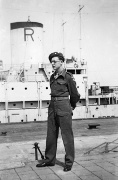 |
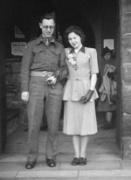 |
| Me on the Cuxhaven docks with the Empire Rapier. 1946. |
Una & me leaving Wilford Church. 3rd January 1946 |
I returned to Cuxhaven. The ship met ice off the German coast and by the time we entered the Elbe estuary the squeal of the ice against the hull was deafening. Back at the Transit Camp my comrades were full of praise for the way I had kept my marriage plans to myself and refused to believe anything else. I made my claim for Marriage Allowance and of course had my leg pulled about letting them know when I wanted an AFA22, which was the army form for children's allowance.
It still looked like a long wait before demobilization. A system was established by the government by which men were returned to civilian life in batches. Each batch had a code number based upon age and length of service. Until then I had not realised how old some of the others were, and suddenly I noticed how many had grey and even white hair. So many would be 'demobbed' before me because my number was 39 - only another year in the army if I was lucky!
We had an easy time in the Control Centre. As long as troops moved efficiently no one seemed interested in us at all. There was not much to entertain the staff. Films at the camp cinema were for the troops in transit so they always saw a different film as long as the programme ran for less than three months. I was pleased with simple diversions such as watching the German coastal defences being blown up. I always watched from the barrack block roof when the Americans, who had an enclave at Bremerhaven, fired experimental V2 rockets from Nordholtz (Bremervorde). Many hours were spent just strolling on the sands. Ron, Ken and I were often met by a little German girl, about five years old, with blonde hair plaited at the top of her head. She would walk between us holding our hands so that we could swing her off the ground as we walked along. Every time she landed she would shout "einmal!".
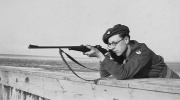 |
| Me with a 'game' rifle. Cuxhaven 1946. |
Almost everyone dabbled in the black market. We had a free issue of cigarettes but many of us did not smoke. Cigarettes had become a form of currency for the Germans and were traded for watches and cameras. We all clubbed together to raise enough cigarettes to trade for a rather good Blau Punkt radio from the local DPs. Displaced persons were usually civilians who had been forced, or sometimes volunteered, to work for Germany. I was delegated to go with a comrade to the DP camp which proved to be an 'Alladin's Cave'! I was frightened by the whole business but we returned safely and everyone was delighted with our new barrack room radio, until we found it had been stolen a few days earlier from a cafe in the docks! We hid that radio and went back to our old Volksradio which, contrary to British propaganda, was capable of getting all the UK radio stations although it was usually tuned to BFN (British Forces Network).
What was considered much worse than trading in the black market was having British currency in Germany. When one of my friends became very seriously ill his parents were brought over to see him, and he told them he had got a fair amount of Sterling. They asked my help to get it back home and so I took the 'Stolen Moments' perfume they had bought and very carefully undid the seal on the box, inserted the notes around the bottle and sealed it again. I told them they must declare the perfume at the customs in Hull or it would be confiscated or they would loose more than stolen moments if it was opened!
There was really nowhere to visit outside Cuxhaven, and transport was just not available. I did however make a trip to Hamburg one day. I cannot remember what excuse I used to make the journey but I expect it was for an eye test or to go to the dentist. I saw my first Russian soldiers in a Hamburg Woolworths. On our return trip we stopped at a fruit farm and I gave the farmer a bar of chocolate in exchange for a box of plums. A little fresh fruit was all we wanted but the farmer thought a bar of chocolate was worth so much more than I did and he started to load the truck while I tried to tell him we were satisfied. A military police vehicle followed us from the farm to Cuxhaven and I thought we were in trouble, but maybe he was on a similar mission!
During 1946 I had two more UK leaves. In April Una and I went to Skegness with Eva and Leonard and their young sons Roger and Martin. Leonard had just been demobilized. In July we were in Wilford and Watford making plans for the future because the end of my military service would be only about two months away.
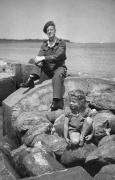
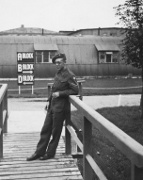
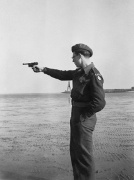
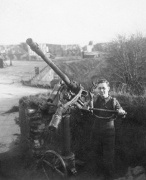
 Home
Home